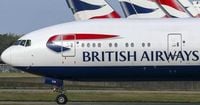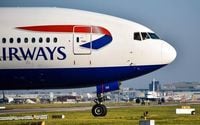On June 28, 2024, a British Airways flight bound for Vancouver was involved in a serious incident during takeoff at London Gatwick Airport, where a pilot error led to a fire on the aircraft. The Boeing 777-200ER, carrying 334 passengers and 13 crew members, experienced a critical situation when the co-pilot mistakenly engaged the left thrust lever instead of the right control column, resulting in a dangerous reduction of engine power.
As the aircraft accelerated down the runway, it reached a speed of 192 mph before the crew attempted to abort the takeoff at 186 mph. This error caused the right main landing gear brakes to overheat, igniting a fire shortly after the takeoff attempt. Thankfully, Gatwick's fire services were quick to respond, extinguishing the flames and ensuring the safety of everyone onboard.
The incident caused significant operational disruptions at Gatwick Airport, which is one of the busiest airports in the UK. The main runway was closed for 50 minutes, leading to the cancellation of 23 outbound flights and the diversion of 16 inbound flights. Passengers faced delays and inconveniences, but, fortunately, all 347 individuals aboard the flight remained unharmed.
The Air Accident Investigation Branch (AAIB) conducted a thorough investigation and concluded that the incident stemmed from an "action slip," a type of human error where a routine action is mistakenly performed incorrectly. Despite the co-pilot's extensive experience of over 6,100 flying hours, including more than 2,700 hours on the Boeing 777, no clear reason was identified for the mistake. The co-pilot expressed surprise at the error and reported feeling well-rested prior to the flight.
In light of this incident, British Airways had issued a safety notice just four days prior, reminding pilots to pause and consider their actions before executing critical maneuvers. The AAIB highlighted the importance of continuous training and vigilance in aviation to prevent such errors from leading to severe consequences.
British Airways has since taken steps to enhance its safety protocols. The airline has included "mis-selections" in its pre-flight briefing materials and is promoting focus during regular simulator training for pilots. The AAIB's findings emphasize that even minor lapses in protocol can have significant repercussions in aviation, underscoring the need for meticulous attention to detail.
In a related development, British Airways' parent company, International Airlines Group (IAG), recently announced a $13 billion order for 32 Boeing 787-10 aircraft as part of its strategy to modernize its long-haul fleet. These new aircraft are expected to replace older models, providing improved fuel efficiency and enhanced comfort for passengers. Deliveries of the new planes are scheduled between 2028 and 2033.
This fleet upgrade comes as IAG reported a first-quarter operating profit of €198 million for 2025, a significant increase from the previous year. The growth has been attributed to rising ticket prices and lower fuel costs, despite a noted slowdown in U.S. consumer demand for economy seats. IAG is also securing Airbus A330-900neo aircraft for its other carriers, including Iberia and Aer Lingus, as part of its fleet modernization efforts.
As British Airways navigates the challenges posed by the incident at Gatwick, the airline is also focused on investing in its future. The integration of new, more efficient aircraft into its operations is a key component of its strategy to enhance long-haul services and improve overall passenger experience.
The June incident serves as a stark reminder of the complexities involved in aviation and the potential for human error to disrupt operations. While the crew's training and coordination ensured that the situation did not escalate further, the operational impact at Gatwick Airport illustrates how a single mistake can create a ripple effect, affecting hundreds of travelers.
In the aviation industry, where safety is paramount, the importance of adhering to established protocols cannot be overstated. The AAIB's investigation findings highlight the need for ongoing improvements in training and procedures to mitigate human error, particularly during critical moments such as takeoff. As airlines like British Airways continue to modernize their fleets and enhance safety measures, the lessons learned from incidents like this one will play a crucial role in shaping the future of air travel.





